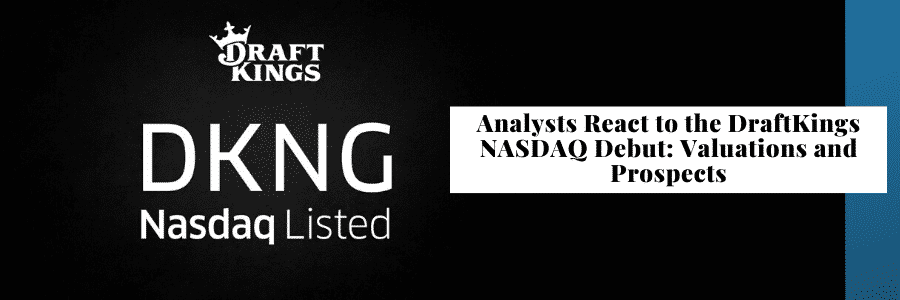Analysts React To DraftKings NASDAQ Debut

DraftKings’ debut under the DKNG US ticker on Nasdaq is a significant step forward for the entire global betting and gaming sector, not least because it gives an indication of the potential value of US-facing business units within various European listed entities.
Morgan Stanley weighed in with its opinion on Thursday when it said that DraftKings was now an “almost pure-play on the early-stage legal US sports betting and igaming growth opportunity.”
Such is analyst Thomas Allen’s enthusiasm that he slapped a $25 price target on the stock. In the wake of this bold figure, the share price rose to over $19 in Thursday trading, valuing the stock at well over $6bn.
Implied Value of the DraftKings Tieup
In Europe, analysts were also looking to see what implications such a valuation might mean for DraftKings competitors. Most notably, FanDuel and Fox Bet (now both part of Flutter Entertainment following the Stars Group merger also set to complete early next week) and MGM/GVC’s ROAR joint venture.
The closest comparator is FanDuel, DraftKings’ erstwhile DFS rival, which, as Gavin Kelleher at Goodbody in Dublin pointed out, had an active database of 2 million compared to DraftKings’ circa 4 million customers.
Yet, perhaps due to the extra heft sports betting heft that came with being bought up by Flutter (then PaddyPowerBetfair) in the immediate wake of the Supreme Court striking down PASPA, FanDuel has established an early lead in states such as New Jersey, Indiana, and Pennsylvania.
DraftKings’ response has involved the merger with sports betting technology group SBTech and the deal with acquisition vehicle Diamond Eagle which not only brings with it technical capacity for DraftKings to own and operate its platform, but also up to $500m of free cash.
The New DraftKings: With Added Tech Capability
Being a master of its technology likely holds the key to the investor enthusiasm, suggests Paul Leyland, an analyst at Regulus Partners in the UK.
“DraftKings was highly exposed without a scalable platform, and almost complete reliance on a third party for an existential product, not just in terms of winning betting market share: failure to do so would risk crumbling the DFS base without the upsell,” he says.
The model here is Bet365. The 20% market share that Morgan Stanley estimates DraftKings can achieve in the US is, not coincidentally, the kind of dominance achieved by the Stoke betting and gaming giant elsewhere in the world.
The critical difference, of course, being that bet365 is also involved in the US market along with many other top challengers. Getting that 20% will be challenging, suggests Kelleher.
“We do not doubt the potential in US sports betting that DraftKings has,” he said. “However, we would argue that to date, FanDuel has outperformed in sportsbook in the US, and we would argue it has a superior portfolio of US assets (TVG, NJ casino and once the TSG deal is completed the Fox Bet tie-up).”
“We expect the full listing of DraftKings (once the high valuation is maintained) to act as a positive read-through for US sports betting assets, particularly Flutter, given the strength of FanDuel,” he added.
US Sports Betting After the Virus
Leyland suggests that the autonomy achieved via swallowing up SBTech will leave DraftKings able to take advantage in the event of the expected post-virus sports betting recovery in the US.
“Those which can innovate will thrive, those caught up in a dwindling, distracted or (conversely) increasingly ruthless supply chain will see their problems compounded,” he adds.
That $500m of spare cash that comes from the merger – as well as the well-priced paper implied by the current and prospective valuations – will also leave DraftKings in a strong position to take part in future M&A.
Leyland suggests that in a very Darwinian fashion, the strong in the US market will inevitably get stronger.
“While we buy into the idea that the crisis will drive consolidation as weaker and smaller operators struggle, these are not always obvious from an M&A perspective, especially if ‘opportunistic’ (but relatively blind) capital is scarce,” he says.
“Much of the consolidation in the months and years to come is likely to be alliances of the strong, in our view, with the weak being on the wrong end of a more organic consolidation process.”
Scott Longley has been a journalist since the early noughties covering personal finance, sport and the gambling industry. He has worked for a number of publications including Investor’s Week, Bloomberg Money, Football First, EGR and GamblingCompliance.com. He now writes for online and print titles across a wide range of sectors.






